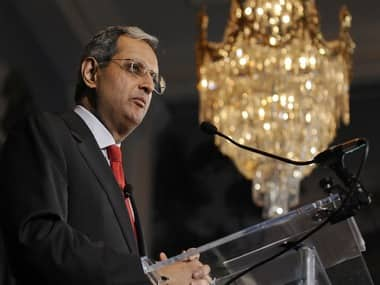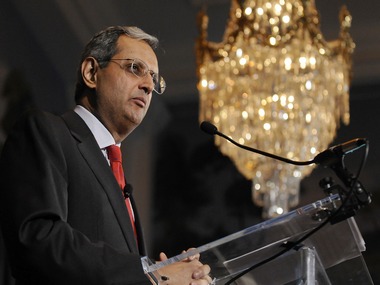Vikram Pandit, the high-profile chief executive officer of Citigroup, thinks that India does not need to get defensive about its slowing economic growth.
“Seven percent growth is nothing to apologise for,” the New York-based Pandit, who has been head of the US-headquartered financial group since late 2007, told The Economic Times in an interview at the World Economic Forum in Davos, Switzerland.
Of late, several businessmen and market experts, Indian and foreign,have been echoing the same sentiment. “India should be feeling good about achieving 7 percent growth,” is the common chant.
[caption id=“attachment_198465” align=“alignleft” width=“380” caption=“Pandit speaks at the Bretton Woods Committee International Council conference in Washington last year. Reuters”]
 [/caption]
[/caption]
Seriously? To be honest, that sounds like a load of bull, because that kind of self-pat on the back could be harmful for growth in the long run.
How? In two ways: one, it makes us believe nothing is really wrong with the economy even as we sub-consciously lower our expectations on growth and two, it leads to a diminishing sense of urgency on the part of the government to get its act together to boost the economy, because no one really expects any better.
To be fair, in a world where economic contraction seems to be the norm for several countries, 7 percent might seem like heady growth. But it is still a big disappointment for an economy once tipped to bound ahead in double-digits.
At the moment, growth projections have been lowered not just for this year ending March 2012, but also for the whole of next year. Economists at many top brokerages don’t expect the Indian economy to expand by more than 7.5 percent even in the financial year ending March 2013.
The government, so far, has done little more than talk up the economy. Weakened by a string of corruption scandals, it seems to have no stomach for introducing large-scale economic reforms.
This, despite the fact that sectors across the board have slowed to a crawl. Infrastructuredevelopment, in particular, has practically stalled because of high borrowing costs and a host of regulatory hurdles.
Investments proposals hit a five-year low recently. As A Subba Rao, chief financial officer of the GMR group, warned ,"If investment-led growth does not happen, we will manage to have a GDP of around 6.5 percent over the next 3-5 years."
In addition, sectors ranging from aviation and power to coal and energy are in a shambles because of skewed policies that have made the operating environment tough and tipped more than one company into financial crisis.
The fiscal position of the government also continues to deteriorate by the day, even as it contemplates a bout of populist measures like the Food Security Bill , which threatens to push inflation into a permanently higher orbit and prevent the central bank from lowering rates to lift the economy’s growth rate.
In short, a large part of the slowing growth can be blamed on internal problems, or more precisely, inactivity on the part of the government. An interest rate cut (expected in coming months) by the Reserve Bank of India might ease sentiment but it’s not the cure-all for all the problems being faced by the economy.
Several brokerages have noted that fact, including CLSA, which, in a note last month, pointed out that while a lot of India’s problems were self-inflicted, government officials seemed content to blame external factors such as the eurozone crisis for its predicament.
In fact, it’s a miracle that the economy is growing at all given how much the government has gone out of its way to stifle it.
Let’s not get used to that. Patting India on the back for 7 percent growth will only give the government more reason to do nothing.
And then, before you know it, we’ll start believing 5 percent growth is nothing to feel deflated about.
)